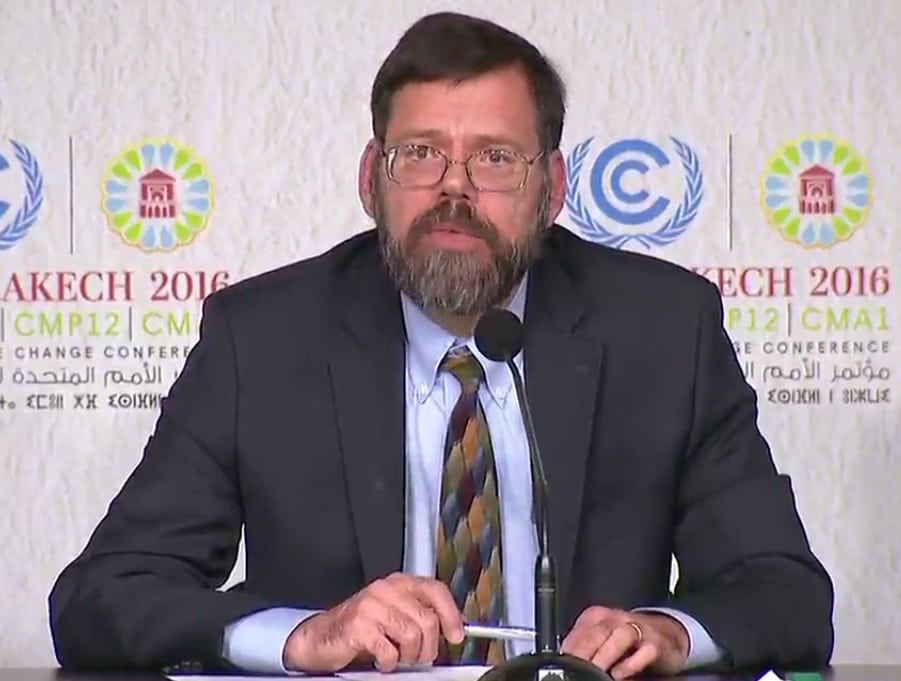
MARRAKESH, Morocco — Donald Trump’s election as president of the United States will have a negligible effect on climate action in other nations, U.S. Special Envoy for Climate Change Jonathan Pershing said Monday. “Heads of state can and will change, but I am confident that we can, and we will, sustain a durable international effort to counter climate change,” Pershing told reporters at the 22nd session of the Conference of the Parties to the United Nations Framework Convention on Climate Change.
Trump has been a vocal opponent of the Paris Agreement, the first global accord on climate change, which entered into force earlier this month. Throughout his campaign, Trump said he would “cancel” the agreement, and reports in recent days indicate he is trying to find a way to withdraw the U.S. from the deal.
The agreement features a legally binding framework under which nations are to pursue non-legally binding domestically determined contributions toward curbing global temperature rise. The commitments were not made mandatory so that that the U.S. could enter the agreement without the consent of Congress, as would have been necessary if the targets were legally binding. Trump, along with many Republican members of Congress, has scorned the administrative sidestep that allowed President Barack Obama to bring the nation into the accord via executive authority.
Trump’s plan to pull the U.S. from the Paris Agreement grew more difficult on Nov. 4 when the deal entered into force. Under the terms of the accord, that milestone means any nation wanting to withdraw would have to wait three years and then undergo an additional one-year extraction process.
Reuters, however, reported over the weekend that Trump might have found a way around the rule, by attempting to pull the U.S. out of the UNFCCC altogether, or trying to find a way to remove the U.S. signature from the agreement.
Pershing offered little comment on these pathways. “I don’t really want to speculate on what the new guys would do,” Pershing said, later suggesting Trump might decide to keep the United States in the deal. “It’s premature to speculate. The new administration may look at the commitment globally, at the interest globally in the issue, and decide how it can move forward in ways that are consistent with its own policies.”
Pershing’s team at the State Department has not yet been in contact with Trump’s transition team, but a meeting will likely be scheduled after COP22. “We look forward to talking to the transition community. Not “committee”?They haven’t been named yet, we don’t know who they are, we don’t know their backgrounds. We will certainly work to convey the importance that we find in this issue to them as they move forward,” he said.
Trump has also suggested he would halt U.S. payments to the Green Climate Fund, a financing mechanism for developed nations to support the climate mitigation and adaptation efforts of developing states. The funding goal of the GCF is to mobilize $100 billion in funding per year starting in 2020. Thus far, the U.S. has paid $500 million to the fund out of a $3 billion commitment – and it fought Congress for even that much.
Regardless, Pershing said he is convinced the U.S. will pay what it promised. “My thinking has been that the U.S. has historically managed to pay its interests and commitments in these activities,” he said, noting later, though, that “The U.S. contribution to the Green Climate Fund over the years that we have pledged is about $3 billion, if we come a little short of that it will have only a marginal effect on the $100 billion.”
The United States has worked with many developing nations on climate issues over the last several years, including small island states, African countries, India, and perhaps most important, China. Under the Obama administration, the U.S. and China, the world’s top two greenhouse gas emitters, teamed up to rally their respective groups of nations to action on climate, the U.S. pushing developed nations and China acting as a beacon for developing countries.
Even if the U.S. withdraws from the Paris Agreement, Pershing said, China will continue to address climate change. “I have had a chance to meet with the senior representative here from China, and he has indicated … that China intends to move forward,” Pershing said. “It doesn’t surprise me, frankly: The deal, the agreement, was struck on the basis of national circumstances and agreements by nations of activities in their interests. Of course, they’re going to move forward.”